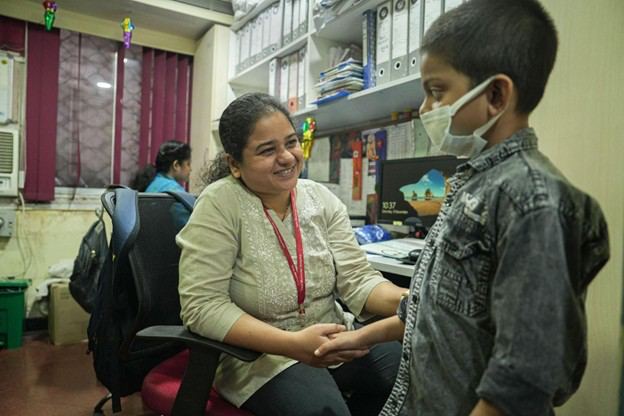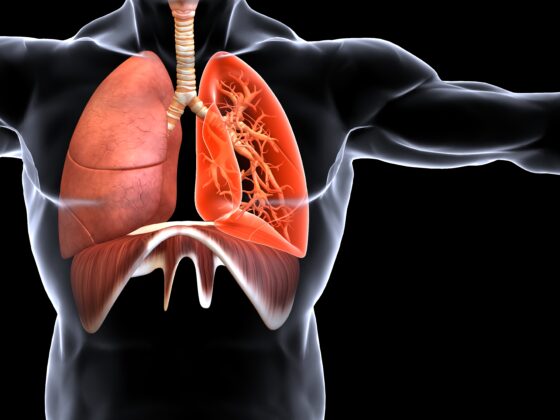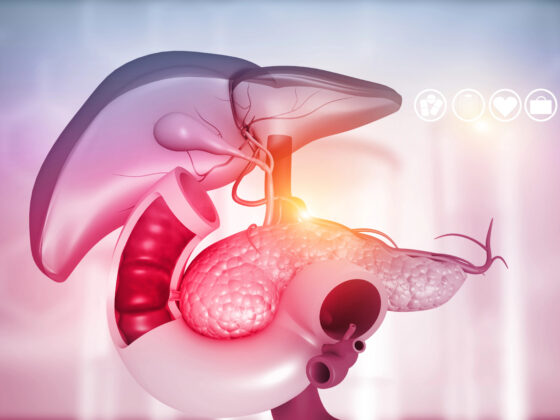Dedicated support from day 1 for families of children diagnosed with cancer has resulted in a reduction in children failing to complete their course of treatment from one in five to one in fifty. The result has been a significant drop in mortality at centres running the programme, writes Swagata Yadavar.
Just 15 years ago, the odds were against children with cancer ever completing their treatment – especially if they happened to be female. Data from India’s largest cancer centre, Tata Memorial Hospital in Mumbai, show that in 2010 nearly one child in every five dropped out by the mid-way point of their treatment course, most of them in the first six weeks. The main reasons, surveys showed, were financial constraints, lack of belief in curability and a gender bias against girls.
But today, there has been a remarkable transformation. By 2022 the treatment abandonment rate had plummeted to just 2% thanks to the efforts of the ImPaCCT Foundation, a non-profit body founded in 2010 by the Tata Memorial Hospital. It provides comprehensive support to all families affected by paediatric cancer, from diagnosis and treatment to post-treatment.
Rates of treatment refusal and abandonment, childhood cancer patients, 2009–2022
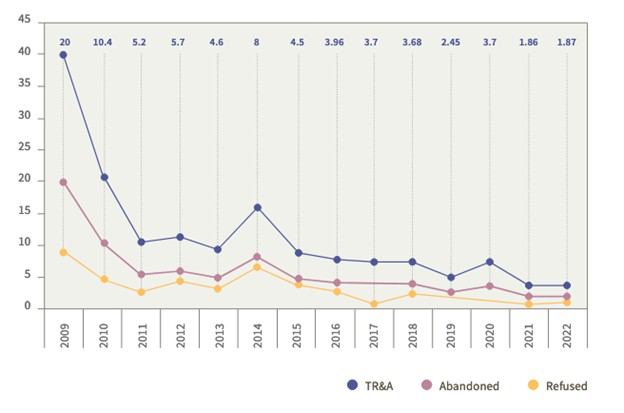
Source: ImPaCCT Foundation, Annual Report 2022-23
From the very start, ImPaCCT (Improving Paediatric Cancer Care and Treatment) focused on supporting families who had come from India’s rural villages and towns to Mumbai for treatment. Knowing no one in the big city, having little money and no place to stay, most parents of children with cancer found the hospital experience overwhelming and arduous. Discouraged by rising expenses and lack of familial support, they often took their children home without completing the treatment and sometimes without even completing initial diagnostic tests.
“The strength of the programme is that the child is supported from day one of registration at the hospital and is supported during the treatment, as well as after completion of treatment for their follow-ups,” said Shalini Jatia, Officer in Charge at the ImPaCCT Foundation.
Discouraged by rising expenses and lack of familial support, they often took their children home without completing the treatment
The reason the programme began in the first place can be traced to exhaustive record-keeping at Tata. Shripad Banavali, head of the hospital’s paediatric oncology department, led an analysis of treatment sheets, which revealed the scale of the problem of treatment abandonment. So Banavali decided to provide holistic support to families, inspired by a similar project at St Jude’s Research Hospital in Memphis, USA, where he had worked previously.
“Paediatric cancer was treated free of cost there, and I wanted to bring the concept to India, because childhood cancer is a highly curable disease and the children here were more impoverished and needed much more support,” Banavali said.
While the average five-year survival rate for paediatric cancers is more than 80% in high-income countries, it is only 30% in low- and middle-income countries, due to the barriers in diagnosis, treatment and care. At the Tata Memorial Hospital, in 2010 the survival rate was 41%. Twelve years of patient records since then show that the department’s efforts resulted in an improvement of child survival rates to 58% in 2018 – an increase of 17 percentage points.
The abandonment rate, which was 20% before 2010, had decreased to below 5% by 2015, and hit 2% by 2021.
The ImPaCCT foundation now supports 4,000 children and their families every year – at the Tata Memorial Hospital and ACTREC (affiliated clinical research centre) in Mumbai, and seven other Tata Memorial centres across India. The model has been replicated at the private Manipal Hospital, and has been shared at international conferences as a template for supporting childhood cancer patients in low- and middle-income countries.
All-round support for patients and families
Initially, the foundation started helping families by assigning a social worker to each one. Then gradually it added help with accommodation and nutrition, providing psycho-social and bereavement support and education. It also funded an “After Completion of Therapy” (ACT) clinic for survivors of childhood cancer.
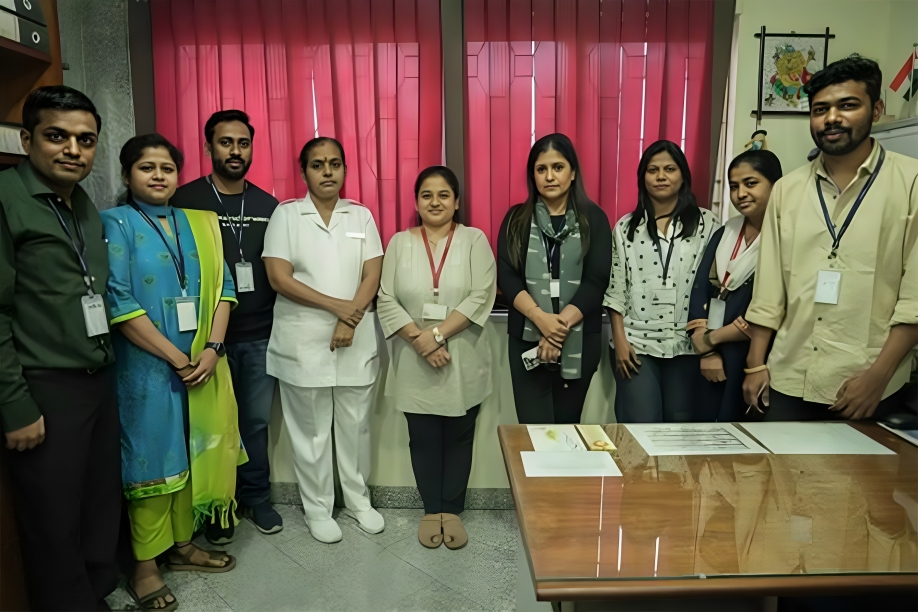
Today, the ImPaCCT Foundation has a multidisciplinary team of over 76 support staff, including data managers, social workers, nutritionists, pharmacists, infection control specialists and psychologists. The ACT clinic has registered more than 5000 childhood cancer survivors.
Gradually it added help with accommodation and nutrition, providing psycho-social and bereavement support and education
Initially, survivors did not come for yearly follow-ups, due to the cost of transport and investigations. Now, the foundation has assigned a separate ‘Survivorship Fund’ that pays for the ACT doctor and funds investigations, medicines and even support for prosthetics. Similarly, a bereavement programme set up in 2013 ensures that families whose children die during treatment get financial support to conduct the last rites and transport the body back to their native home.
A new programme called ‘Full Circle’ allows childhood cancer survivors to provide services and mentorship to new patients. For example, one of the survivors has become a choreographer and comes to the wards to teach children dance once a week.To fund all its activities, the foundation initially relied on help from other NGOs, individual donors and government grants. The introduction in 2014 of a corporate social responsibility law, which requires eligible companies to contribute 2% of net profits to social causes, was a “game-changer”, says Jatia. “It significantly increased funds for paediatric cancer care.”
Access to financial aid for treatment has also improved since the 2018 introduction of the Pradhan Mantri Jan Arogya Yojana, a national health scheme that provides cover to all under-privileged families for hospitalisation expenses. ImPaCCT social workers help parents access government grants by assisting them with documentation, which reduces turnaround times.
The price of success
In an article on ImPaCCT published in Pediatric Hematology Oncology Journal, Jatia, Banavali and colleagues pointed out that the model has the “potential to be adapted and implemented in other centres treating children with cancer across India and similar settings”.
Jatia says the work is never-ending but “deeply satisfying”. The hundreds of children who are thriving are testament to the foundation’s work – but so are the parents of children who died and who want to remain associated with their work, because it gives them strength. “It speaks to their relationship with the hospital and the foundation,” she said.
But as the demand has increased, so has the need for funds. “The number of cases being registered is on a rise, and there is a dire need to raise additional funds to support this,” says Jatia. “Additionally we need funds for second line treatment, high end therapies and bone marrow transplants.”
The opening illustration shows Samruddha Kulkarni, medical social worker with ImPaCCT, speaking to a young patient at Tata Memorial Hospital. Photo credit: © Afzal Adeeb Khan

